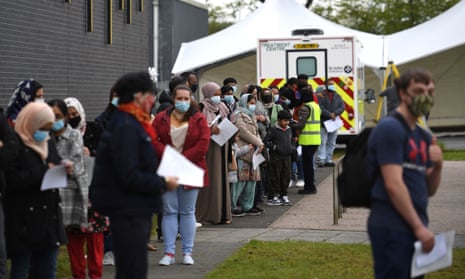The government is acting “coolly” and “calmly” to tackle the coronavirus variant first found in India as social distancing measures are further eased on Monday, the health minister Edward Argar has said.
At a press conference on Friday, Boris Johnson said he would press ahead with allowing indoor gatherings of six people or two households in England from next week, though the final stage of lifting restrictions in June could face “serious disruption”.
His comments came amid warnings from scientists that the new variant of concern first detected in India, B.1.617.2, could lead to a “significant” surge in infections, and could be up to 50% more transmissible than the variant first detected in Kent.
“As Chris Whitty said yesterday, it’s possible [it could be more transmissible], but equally it could be much less more transmissible, if that makes sense,” Argar told BBC Breakfast on Saturday.
“We don’t know how much more transmissible it is yet. All the evidence so far suggests there is no evidence of increased severity of illness or that it evades the vaccine.
“So, at the moment, on the basis of the evidence we are doing the right thing, coolly, calmly continuing with Monday, but keeping everything under review.”
Argar added that people should take personal responsibility when deciding whether or not to hug loved ones, when allowed to do so.
“You have to take all the facts into consideration,” he said. “It’s about personal responsibility, it’s about making the right judgment call.”
Prof Chris Whitty, England’s chief medical officer, had warned on Friday that a more transmissible B.1.617.2 variant would mean “a really significant surge” in infections, as he predicted the variant could become the most dominant strain across the UK.
On Saturday, Prof Anthony Harnden, deputy chair of the Joint Committee of Vaccines and Immunisation (JCVI), said coronavirus vaccines were “almost certainly less effective” at reducing transmission of the variant.
Harnden, who advises the government on vaccinations, told BBC Radio 4’s Today programme: “The vaccines may be less effective against mild disease but we don’t think they’re less effective against severe disease. But in combination with being less effective against mild disease, they’re almost certainly less effective against transmission.”
Argar said there had been a “minor increase” in people presenting at hospital with the virus, mainly among unvaccinated people aged between 35 and 65 in Bolton, where, alongside Blackburn with Darwen, the army will be deployed to help mass testing efforts.
As cases of the B.1.617.2 variant nearly tripled over the past week, targeted surge testing is taking place specific areas across England, including in several London boroughs, Sefton, Worcester, Lancashire and Nottingham. Harnden said there were still “lots of unvaccinated people in at-risk groups in these areas”, telling Today: “The worry is that those unvaccinated vulnerable individuals, those over 50, will develop Covid from this more transmissible [variant] and end up in hospital.”
People eligible for a vaccine in areas where the variant has been found to be circulating are being urged to get the jab.
Argar also defended the government’s border controls, as criticism of Johnson’s tactics to curb the import of new variants from abroad intensifies. He said: “Our border controls to reduce the risk of an importation of a new variant of the disease are among the toughest in the world.
“I do think we’ve got the right border controls in place to minimise, you can never totally eliminate, but to minimise the risk of not just this variant but other variants in the future.”
Asked why Bangladesh and Pakistan were added to the red list before India, he said the decisions were made “on the basis of the evidence, based on a number of factors”.
“There’s a number of different factors, it’s not a binary thing,” Argar added.
On Friday, Johnson told a Downing Street press conference that England would face “hard choices” if it transpired that the variant was more transmissible than previous ones.
The minutes of a Scientific Advisory Group for Emergencies (Sage) meeting on Thursday showed the scientists believe there is a “realistic possibility that it is as much as 50% more transmissible”.
To protect against the variant, Johnson announced that clinically vulnerable people and those over 50 would be fast-tracked in getting their second vaccine doses.
One Sage member, Sir Mark Walport, said the race between the spread of coronavirus and the vaccination rollout had “intensified”, following rise of the variant first found in India.
“There is a high degree of scientific confidence that this new variant is up to 50% more transmissible than the previous B117 variant. So, if you like, the knife-edge on which the race sits has just sharpened.”
